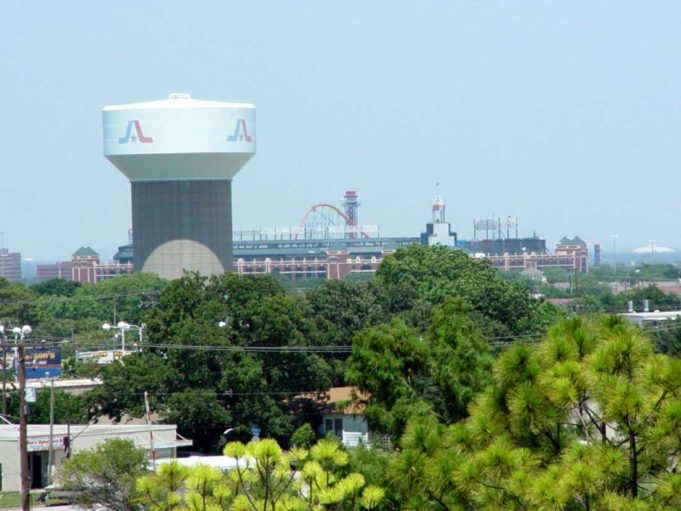Arlington officials have been wooing a Fortune 500 company so hard that some townsfolk are feeling like the nerdy best friend. Longtime local homebuilder D.R. Horton is moving its corporate office from downtown Fort Worth to North A-Town in about a month. Company officials released a statement saying the relocation “will provide us with a new company-owned headquarters that is conveniently located in the heart of North Texas with great access to DFW International Airport.”
The move was just the type of transformative development city leaders envisioned for the Entertainment District, the area near Wet N Wild Way that includes Six Flags Over Texas and AT&T Stadium. But they had to pay $5.5 million to make the deal go down, and that money was plucked from the Water Utilities budget, according to city officials.
Then in January along came an algae outbreak at Lake Arlington. Some residents complained about the tainted smell and taste of the city’s drinking water and put two and two together –– rightly or wrongly –– to come up with what they considered a plausible theory: The city blew its wad courting Mr. Rich Guy Horton and didn’t have money in the budget to fix the problems causing the stinky water.
City officials, however, poked holes in that theory, saying that the money paid to Horton had no impact on the algae invasion, the city’s response, or the water supply. And the officials believe the city will be better off in the long run because Horton is bringing in jobs and that the stinky water was a temporary problem that has since been resolved.
Arlington City Councilmember Charlie Parker, who helped negotiate the agreement with the big-time homebuilder in August 2015, had to figure out a way to come up with the money needed to recruit Horton without using city taxes.
“D.R. Horton wanted $5.5 million of your tax money to come to this city,” Parker told the audience at a town hall meeting in 2015. “I said, ‘No.’ ”
Horton wanted the money to pay for infrastructure surrounding the site.
Instead, Parker encouraged Water Utilities Director Walter “Buzz” Pishkur to figure out a way to get the cash. One of the architects of the Horton agreement, Pishkur created a revenue stream by increasing the amount of water that the city purifies and sells to neighboring burghs, Parker said.
About 18 months after the deal was made, an unseasonably warm winter prompted the algae outbreak at Lake Arlington, water officials said. The water that residents were complaining about came from the Pierce-Burch Water Treatment Plant, which takes its raw water from Lake Arlington.
Complaints began to roll in on social media. On Facebook, Arlington resident Jennifer Hurley wrote, “Arlington says it isn’t harmful, but my oldest son has been covered in hives” and “this has caused my son a lot of suffering.”
The criticisms weren’t just about the water but the deal itself. Some of the criticism came from Arlington resident Terry Hulsey, who confirmed his concerns to me last week in a phone conversation.
“My concerns are that Parker used the city’s water department as a personal piggy bank to lure a business into the city,” Hulsey said.
Hulsey also questioned if any of the jobs coming in would be new.
Horton and company, he said, “already have 500 people working for them at the Fort Worth office.”
While those 500 jobs will be moving to Arlington, there is no assurance that the employees themselves will also relocate to Arlington or simply commute from their current homes.
Founded by Chairman Donald R. Horton in 1978 in Fort Worth, D. R Horton is the largest homebuilder by volume in the United States, with operations in 78 markets and 26 states, according to company records. As of Dec. 31, 2016, the company employed about 7,100 people nationwide.
Horton’s current North Texas employees, Hulsey continued, “are just going to add 10 minutes to their commute by coming here. Nobody new is going to be hired.”
Pishkur said that money funneled to the Innovative Venture Capital Fund, which is used to attract businesses such as Horton to the city, did not affect the Water Utilities budget, lead to the algae invasion, or hamstring city officials in trying to solve the problem.
“What we did … was put up collateral,” Pishkur said. “What we did would never in any way impact our ability to do our job, run Water Utilities … or anything else.”
Horton’s end of the bargain, according to the deal, is to bring in 350 jobs over a 20-year period and meet a few other provisions.
Mike Finely, Arlington’s director of finance, said Water Utilities essentially fronted the money to attract Horton but will eventually get it back from the venture capital fund.
“The water department is being paid back in three increments of $1.8 million,” he said. “The first one has already been made.”
The second and third payments will be made this year and in 2018, respectively, Finely said.
Pishkur said water quality problems arose after the city’s only other treatment plant, the John F. Kubala facility, was strategically taken offline to undergo upgrades. Beginning last year, Pishkur continued, the city is spending about $14 million to upgrade both of its water treatment plants with newer equipment designed to eliminate organic impurities and maintain the water quality.
“We only take plants offline during low-pumping seasons, which for us is usually from about mid-January to April,” Pishkur said. “Unfortunately, we had one of the warmest winters ever, so organic activity moved a month out of sequence.”
City officials issued a statement after the Kubala plant came back online on March 6: “The Kubala plant receives its water from reservoirs in East Texas, which have not experienced the same high level of seasonal organic activity experienced in Lake Arlington in February. The Kubala plant is now providing water for all Arlington residents. The City anticipates this change in source of untreated water will relieve recent taste and odor issues.”
Pishkur said the deal with Horton has the best interest of residents at heart.
“We thought it was a brilliant strategy based on a lot of history, but we had a winter that was extraordinary, and the window we picked didn’t work out perfectly,” he said. “The good news is the [the water treatment upgrade] came in on budget, on time, and is providing excellent results.” l












